The 2012 International Symposia on Cultural Diplomacy
"Human Rights, Sustainable Development, Economic Equality & Global Risks"
Comment on Cultural Diplomacy
By ICD Advisory Board Member Dr. Erkki Tuomioja, Finnish Minister of Foreign Affairs

Actually, both definitions are prisoners to outdated concepts of power politics, but the more common Wikipedia definition is clearly less satisfactory in this respect. Nye's definition at least refers to legitimacy and values and actually implies that while hard power may get others to do what you want, it will not increase your attractiveness, legitimacy or the adoption of your values. This can be condensed in the conclusion, that neither hard nor soft power can be assessed without also knowing and evaluating the aims and goals of their use.
The use of soft as well as hard power always begins - and ends - with diplomacy, that is, "the art and practice of conducting negotiations between representatives of groups or states". Diplomacy is thus an instrument, through which different actors conduct policy.
And what about cultural diplomacy? I am quite pleased that the Institute for Cultural Diplomacy has adopted the definition used by Milton C. Cummings, who describes 'cultural diplomacy' as: "the exchange of ideas, information, values, systems, traditions, beliefs, and other aspects of culture, with the intention of fostering mutual understanding". This makes it explicitly clear that we are talking about a two-way street, for no matter how convinced we might be about the superiority of our values, practices and achievements, we must still approach others with an open mind and a readiness to engage with everyone on equal terms.
However, like diplomacy itself, cultural diplomacy is also about negotiation, where the intention really goes beyond the need to reach mutual understanding. This means that on the basis of this understanding, we must also be able to agree on the set of rules needed in today’s globalizing and interdependent world, so as to be able to effectively deal with all the crises I referred to at the beginning of my remarks. Thus all of our diplomatic efforts, cultural and other, must be oriented towards defining and implementing the set of multilaterally agreed upon universal rules that global governance needs for our survival in a world of nine or ten billion people.
It is, however, important to add a warning about the limits of mutual understanding. It must not be interpreted as implying that “anything goes". Accepting multiculturalism, for example, cannot mean adopting the kind of cultural relativism that can be used as an excuse for human rights violations, big or small. Understanding why people become suicide bombers in the name of the Islamic God, or steal Palestinian land, making others homeless, because they believe that they are God's Chosen People, cannot mean condoning or giving impunity to people whose deeds violate the life, liberty or other Human Rights of anyone, be it for any religious or ideological reason. We can and should tolerate many things, but not the kind of intolerance which infringes upon other peoples rights and is happy to condemn half of mankind, namely women, or any other groups or individuals, to inferior status.
Thus all our diplomatic efforts, cultural and other, must be made within the framework of the set of basic values and principles embodied within the Universal Declaration of Human Rights. Subsidiarity is a good principle, which the EU should endeavour to respect when dealing with many economic, social and cultural policy issues. But human rights violations are neither a subsidiarity issue nor the internal matter of any state.






















































































